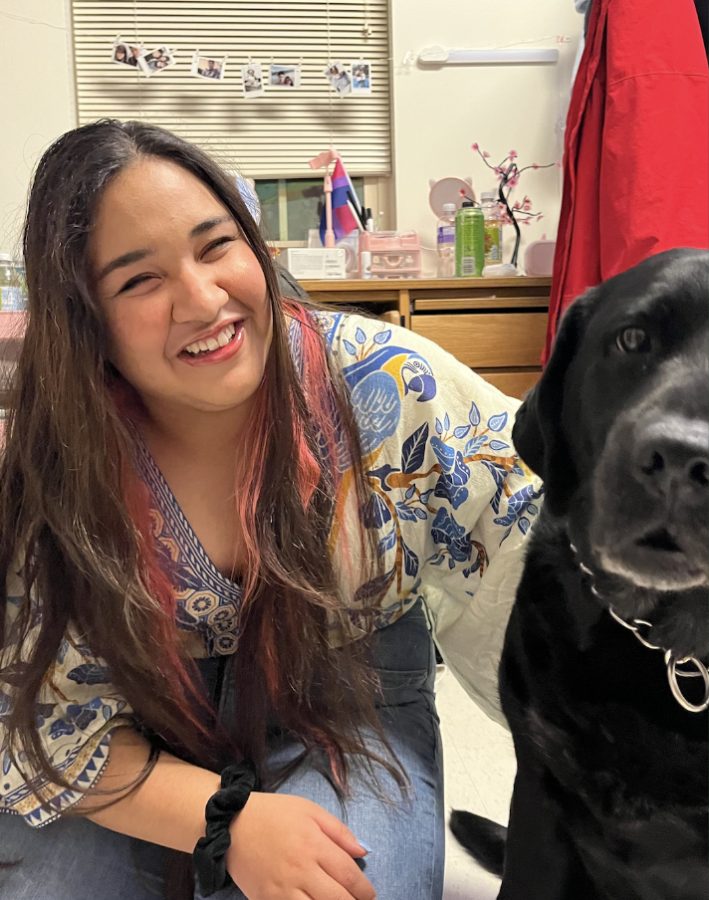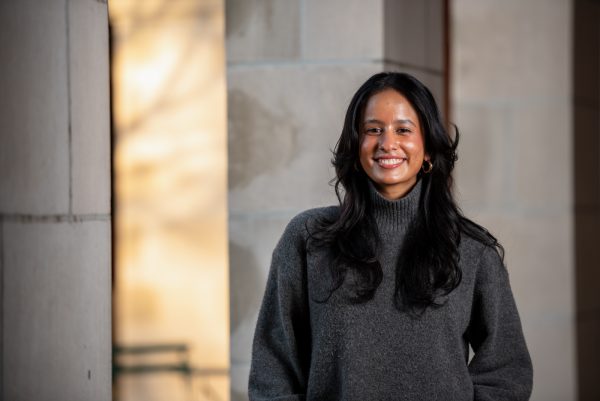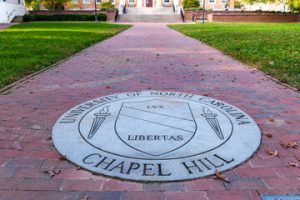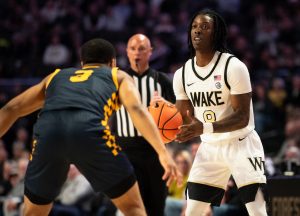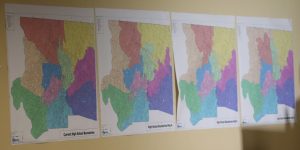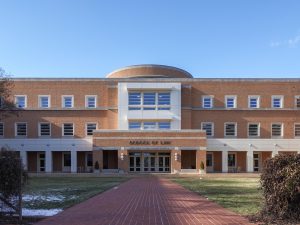Deacon Profile: CC Carjaval
Carjaval shares how she navigates the world with microphthalmia
CC Carjaval poses with her seeing-eye dog.
February 3, 2023
Sophomore CC Carvajal is from Charlotte, NC, and hopes to become a clinical psychologist. Currently pursuing a major in psychology and a minor in Spanish, she plans to obtain a doctorate after graduation. In her free time, she participates in OLAS (Organization for Latin American Students) and is passionate about the beauty industry. Along with having a great sense of humor and a kind demeanor, Carvajal navigates the world while being unable to see. The below interview has been edited for brevity and clarity.
Can you describe to me your condition and how long you’ve had it?
I have microphthalmia, Latin for “small eye,” which is what it is — my eyes are underdeveloped. Typically, the condition only affects one eye, so it’s uncommon that it does affect both. I’ve had it since birth. I was told I would only have light and shadow perception, but as I grew older, we discovered I could see colors and a few shapes.
Many, including myself, struggle to interact respectfully with someone who is blind. What do you wish people would do more often?
I appreciate this question because a lot of people don’t consider that. I don’t blame people for anything because it’s not their fault. But given the opportunity to educate someone, I will always take it. I wish people didn’t assume unless I specifically ask for something. When someone offers unnecessary visual feedback, it’s not helpful. I would appreciate only what I ask for because that’s what I know, by now, will be helpful for me.
What do you wish people wouldn’t do so often?
When someone comes up to me and grabs me, it’s startling. If you have any questions, ask. I can’t speak for everyone because I am only one person in this community, but I will not be bothered by it. I’d rather people ask and know than be ignorant and not know. That’s the only way to break down stereotypes and barriers.
How do you use technology to interact with your friends?
That’s a good question. Luckily, technology has been a blessing because it has come so far. For example, my phone has a “text-to-speech” engine that is built into Apple devices. It works seamlessly. It’s come to the point where I have apps that will help me take pictures and describe them for me. Some will even describe people, which is kind of funny because sometimes it’s accurate and sometimes it isn’t — at all.
What do you use to complete assignments for class?
In high school, I used a MacBook, but I’m not huge on technology. I like to keep it simple. Now I use this hybrid where the bottom half has a Braille display controlled through technology. It raises to indicate the letters that are supposed to be read. I can do text-to-speech, but when I’m in class, it would be kind of inappropriate for me to have it playing out loud.
When did you learn Braille?
I learned Braille when I was about three. They wanted me to start early so that by the time everyone else started reading, I had a foundation. It’s interesting because they started by exposing me to different textures. Your fingers have to sensitize to it, so they would start having me match textures to each other, like felts and sandpaper.
What was your experience like during your childhood?
In my earlier childhood, I didn’t realize I was different from everyone else, so I would do whatever I wanted! I would go to jungle gyms, I would do monkey bars, and I didn’t notice or care. My parents let me do whatever I wanted. Growing up, I had that mentality. I would ride a bicycle around and crash into cars, and I was like, “Oh! People do that all the time! It’s not me.” I have a little sister, so I would bother her. I was pretty much a normal kid.
When did that experience change?
Late elementary school into middle school is when I realized that there was something different. I would go to a special class during the day that others wouldn’t. Other people were able to notice things about the world that I couldn’t. I didn’t know there was this whole other way of viewing the world that I never knew about. Back then, people were typical middle schoolers, trying to figure themselves out. That was when I experienced a lot of exclusion. I don’t blame people for it. It’s a product of not knowing how to interact and a fear of not wanting to offend me. In seventh grade, I found a group of friends who took me in. Through them, I was able to open other people’s expectations of what I should or shouldn’t be able to do.
How has Wake Forest as an institution and specifically professors accommodated your disability?
I was impressed by how intricate Wake Forest’s CLASS (Center for Learning, Access and Student Access) services are, which houses the disability services department. A priority of mine was having proper accommodations because otherwise, I can’t be the most successful version of myself. I’ve got to give a shout-out to the professors who had open communication and asked what worked best for me. That was meaningful. In high school, teachers would assume. I understand that it comes from a good place, but I know what works for me. Professors here were willing to hear me out.
Do you know of other people at Wake Forest with a disability? Is there any community?
Unfortunately, that’s an area that is lacking. I know of other students with disabilities, but there aren’t specific events. The disabled community might be too small to be considered a priority. I’ve met a couple of people in passing, including other service dog users, and it has been nice to be connected with people who understand what I’m going through.
Do you have any lessons you have learned from growing up with your disability?
Yes! At first, I would do things to prove myself to others. I’ve realized, especially here, that by doing things that people don’t expect me to do, I’m breaking the stereotype. I don’t want to be seen as inspirational or someone to idealize because I’m a person in the same boat as everyone else trying to get through college. As long as people view me as a regular person who happens to be blind, rather than someone who is blind being able to do all these things, I’m conveying to others that all disabled people are normal people.



